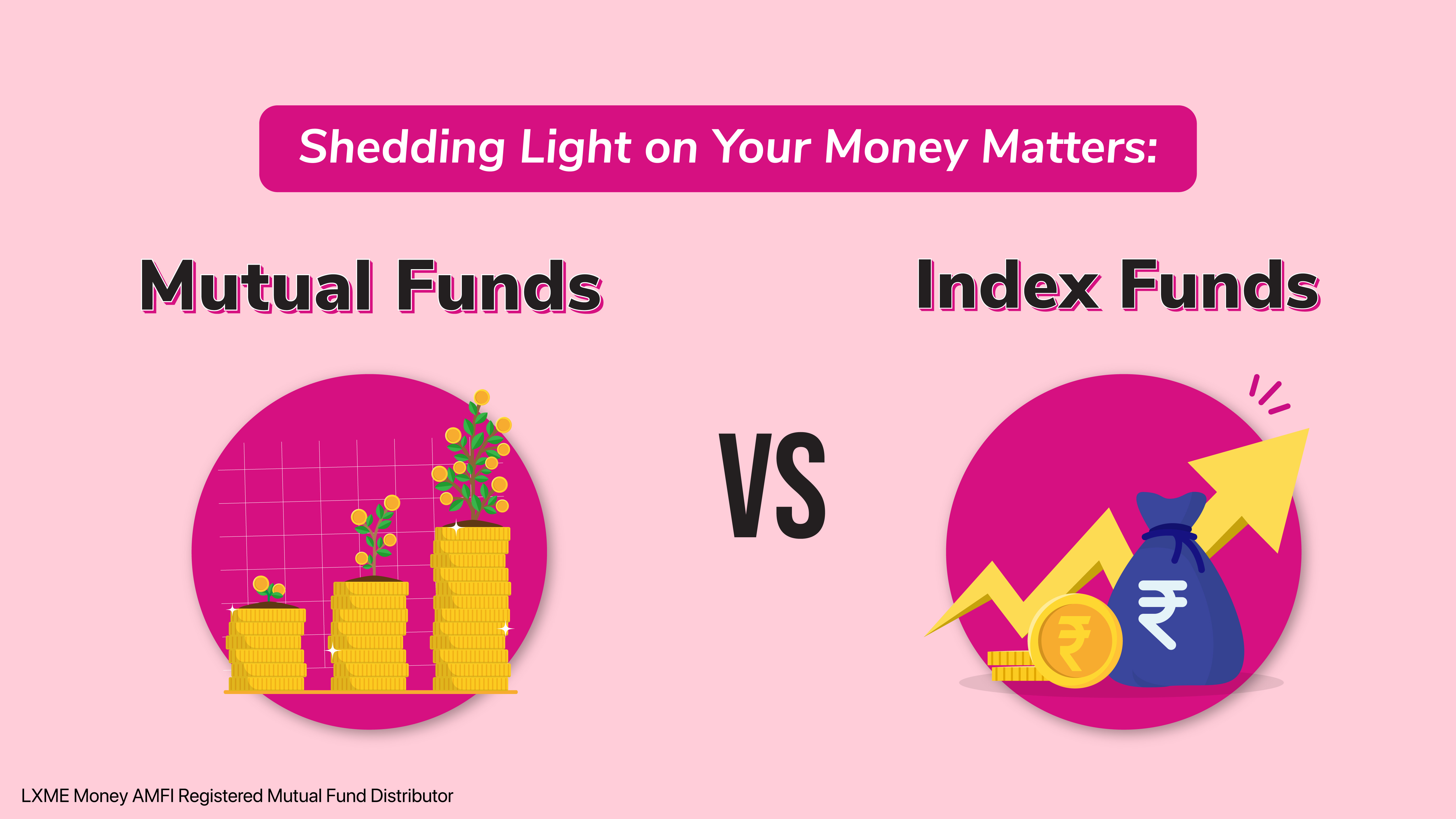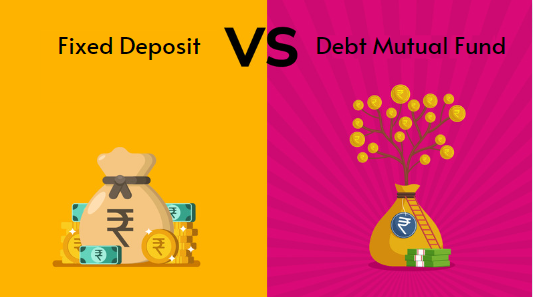Embark on a financial journey to clarity as we demystify the choice between debt mutual funds and fixed deposits. At LXME, we unravel the nuances in our latest blog – ‘Debt Mutual Funds vs Fixed Deposits: Where You Should Invest.’ Discover the key factors guiding your investment decisions in this insightful exploration. Let’s navigate the realm of financial choices together and unveil the FD vs Mutual Funds argument.
Traditionally, we have been investing in Fixed Deposit (FD) as it is considered the safest mode of investment offered by banks. Earlier generation used to rely more on FDs as they use to deliver fixed interest over a period of time.
Now, is it time to change or shift towards a smarter investment option? Absolutely yes!
If you want to invest in a low-risk investment instrument that offers you better returns along with tax efficiency, then which instrument we are talking about? Yes! It’s Debt Mutual Fund.
Let’s learn about the same,
What are Debt Mutual Funds?
– Debt funds are the fixed income funds that offer capital preservation.
– These funds invest in debt instruments like commercial papers, government securities, treasury bills, corporate bonds, and many other money market instruments.
– The debt issuer pre-decides the interest as well as the maturity period.
– Investors with lower risk capacity choose to invest in these types of funds. Ideally, the portfolio of every investor should consist of some proportion of debt for stability.
– Fund managers of these funds select the debt securities which are high-rated debt instruments in order to reduce credit risk it (is the possibility of a loss resulting from a borrower’s failure to repay a loan or meet contractual obligations). These instruments are less likely to default.
How are debt mutual funds tax efficient?
Your investments in debt mutual funds will only get taxed at the time of withdrawal, so let’s have a look at how it is taxed,
Any capital gains arising on these funds vary depending upon the holding term of the investment.
If you are invested in Debt Mutual Funds and you sell these mutual fund units then the following taxation will be applicable:
- Short-Term Capital Gains (STCG): Capital gains on debt mutual funds held for less than 3 years are taxable at applicable income tax slab rates.
- Long-Term Capital Gains (LTCG): Capital gains on debt mutual funds held for more than 3 years are taxable at 20% with indexation benefit.
– You can start investing in Debt Mutual Fund with just ₹100.
You can check out the LXME app and look out for debt portfolios offered as they are diversified, well-researched and curated by experts and start investing as per your goals!
Now let’s learn about Fixed Deposits,
What are Fixed Deposits?
-Fixed deposit are financial instrument provided by banks, non-bank financial institutions, and post offices which is a guaranteed return investment option for fixed maturity time.
– In India, FD is popular investment option because it offers a higher rate of interest than a regular savings account.
– As per the Income Tax Act, 1961, the interest earned on fixed deposits is added to the ‘Income From Other Sources’ and is fully taxable.
– The interest you earn on a fixed deposit is taxable as per your income tax slab. So if the interest rate of the FD is 5%, the post-tax rate would be 3.5% if you fall in the 30%.
– If your interest income exceeds Rs 40,000 (Rs 50,000 in the case of senior citizens) then banks needs to cut 10% TDS on your interest.
Difference between FDs vs. Mutual Funds
Let’s understand which investment option is more tax efficient with an example.
| Particulars | Fixed Deposit | Debt MF |
| Investment Amount | 10,00,000 | 10,00,000 |
| Returns p.a. | 7.00% | 7.00% |
| Year 1: | ||
| Principal | 10,00,000 | 10,00,000 |
| Interest | 70,000 | 70,000 |
| Tax | -24,874 | – |
| Year 2: | ||
| Principal | 10,45,125 | 10,70.000 |
| Interest | 73,158 | 74,900 |
| Tax | -25,997 | – |
| Year 3: | ||
| Principal | 10,92,287 | 11,44.900 |
| Interest | 76,460 | 80,143 |
| Tax | -27,170 | -23,732 |
| Balance after 3 years | 11,41,577 | 12,01,310 |
| Returns p.a. | 4.51% | 6.30% |
Assumptions for the above calculations are:
– Tax on yearly interest will have to be paid in case of fixed deposits
– Debt Mutual Funds will be taxed at the time of withdrawal.
– Interest on FD is assumed to be taxed at 35.535% (Incl. Surcharge & Education Cess)
– Capital Gains on debt mutual fund is assumed at 23.69% after indexation (inflation assumed at 4%)
Key takeaways:
FD vs Mutual Funds:
Fixed Deposits offer fixed returns with a predetermined interest rate and tenure. Mutual Funds involve market investments, providing variable returns based on market performance with higher liquidity.
Benefits of Fixed Deposits:
Fixed Deposits assure fixed returns, principal protection, and no market risk. They are suitable for conservative investors seeking stability and a guaranteed income stream.
Benefits of Mutual Funds:
Mutual Funds offer diversification, professional fund management, and the potential for higher returns. They suit investors seeking growth and willing to bear market fluctuations for long-term gains.
So, make smart investment choices that are tax efficient and can provide good returns on your investment, along with other benefits like flexibility, the advantage of professional fund management, etc.
The most important thing you need to consider is diversifying your portfolio in different asset classes to ensure your portfolio is optimizing the risk and returns along with being tax efficient.
If you found this helpful, share this blog with your friends and family!!
Download the LXME app now to start investing!
Related Article You May Like: – Financial Planning for Women: Expert Guidance for a Secure Future
FAQs – Common Questions on Debt Mutual Funds vs Fixed Deposits
Which is better FD or debt mutual fund?
Is it good to invest in debt mutual funds?
Investing in Debt Mutual Funds: Yes, for diversification and flexibility. LXME’s blog details why debt mutual funds can be a smart addition to your portfolio.
Is debt mutual fund tax free?
Debt Mutual Fund Tax Implications: No, they aren’t entirely tax-free. Explore LXME’s insights on the tax implications of debt mutual funds for a comprehensive understanding.
What are the key differences between Debt Mutual Funds and Fixed Deposits?
Debt Mutual Funds offer market-linked returns, while Fixed Deposits provide fixed interest rates. Mutual funds offer liquidity, but FDs have a lock-in period. FDs offer guaranteed returns, whereas mutual funds are subject to market risks.
Which is better for short-term goals: Debt Mutual Funds or Fixed Deposits?
For short-term goals, Debt Mutual Funds are preferable due to flexibility and potentially higher returns. Fixed Deposits provide stable returns but may lack the liquidity needed for short-term objectives.
New Investor? Request a Callback.
Fill in your details and we will guide you at every step
other blogs

Mutual Funds July 1, 2024
Shedding Light on Your Money Matters: Mutual Funds vs Index Funds
Conquering your financial goals takes knowledge and the right tools. At LXME, we empower women to take control of their money with online SIP investments. Today, we’ll delve into the world of mutual funds and index funds, two popular investment options. Understanding the difference between mutual fund and index fund will equip you to make … Shedding Light on Your Money Matters: Mutual Funds vs Index Funds

Mutual Funds
Conquer Your Future: Best SIP Plans for 30 Years and Building Financial Freedom with LXME
At LXME, we empower women to take control of their finances and achieve financial freedom. We understand the unique challenges women face when it comes to money matters, and that’s why we’ve built a safe and supportive investment platform designed exclusively catering to investment for women. But financial freedom doesn’t happen overnight, it requires a … Conquer Your Future: Best SIP Plans for 30 Years and Building Financial Freedom with LXME

Money Hacks Mutual Funds June 27, 2024
Navigating the Best Time to Buy Shares for Long-Term Growth
In the dynamic world of stock markets, strategic timing can be a game-changer for long-term investors. Our comprehensive blog, “Trying to Time Investments? Here Are Some Tips,” available on LXME, offers valuable insights into mastering the art of timing in stock investments. Uncover tips and strategies to identify the opportune moments to buy shares for … Navigating the Best Time to Buy Shares for Long-Term Growth









